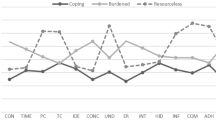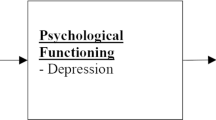Abstract
Anxious and avoidant attachment may be detrimental for diabetes distress and management. Additionally, individuals’ perceptions of their partner’s involvement may affect these associations. The study explored cross-sectionally and at the daily level whether anxious and avoidant attachment associated with diabetes distress or stressors and diabetes management, and whether higher perceived collaboration and support (C&S) moderated associations between attachment and diabetes management. Individuals with type 1 diabetes (N = 199; M age = 46.82; 52.3% women) completed measures of diabetes distress, diabetes-related C&S, self-care, average blood glucose (hemoglobin A1c), and attachment insecurity, and daily diary measures of diabetes-related C&S, diabetes stressors, mean blood glucose, and self-care. Higher anxious and avoidant attachment associated with higher diabetes distress. Higher anxious attachment associated with more daily stressors. Anxious attachment associated with lower self-care. C&S did not moderate any associations. Findings highlight the need to consider attachment when designing interventions to reduce diabetes-related distress.
Similar content being viewed by others
Notes
Speaking English as a primary language was necessary for cognitive testing that was part of the larger study protocol.
Supplemental analyses of the interpersonal distress subscale were conducted post hoc but for clarity the results are not presented. In general, interpersonal distress did not have as strong associations with attachment insecurity or diabetes management compared to the originally used total score of diabetes distress. However, the pattern of results was largely the same.
In addition to the a priori covariates we tested, we also examined low blood glucose episodes in a typical week and comorbidities as covariates post-hoc. Our results were the same with the addition of these post-hoc covariates. However, as the variables themselves were less interpretable than our a priori covariates, we chose to not include them in the main text.
As C&S was conceptualized as the moderator, we included the interaction on Level 2, despite the data being daily diary. Additional analysis examined cross-level interactions between attachment and C&S, and found similar results.
References
Berg, C. A., Butner, J. E., Butler, J. M., King, P. S., Hughes, A. E., & Wiebe, D. J. (2013). Parental persuasive strategies in the face of daily problems in adolescent type 1 diabetes management. Health Psychology, 32, 719–728. https://doi.org/10.1037/a0029427
Berg, C. A., Schindler, I., Smith, T. W., Skinner, M., & Beveridge, R. M. (2011). Perceptions of the cognitive compensation and interpersonal enjoyment functions of collaboration among middle-aged and older married couples. Psychology and Aging, 26, 167–173.
Berg, C. A., Wiebe, D. J., Suchy, Y., Hughes, A. E., Anderson, J. H., Godbey, E. I., et al. (2014). Individual differences and day-to-day fluctuations in perceived self-regulation associated with daily adherence in late adolescents with type 1 diabetes. Journal of Pediatric Psychology, 39, 1038–1048. https://doi.org/10.1093/jpepsy/jsu051
Beveridge, R. M., Berg, C. A., Wiebe, D. J., & Palmer, D. L. (2005). Mother and adolescent representations of illness ownership and stressful events surrounding diabetes. Journal of Pediatric Psychology, 31, 818–827. https://doi.org/10.1093/jpepsy/jsj094
Bretherton, I. (1992). The origins of attachment theory: John Bowlby and Mary Ainsworth. Developmental Psychology, 28(5), 759–775. Retrieved from http://catalogue.curtin.edu.au
Campbell, L., Simpson, J. A., Boldry, J., & Kashy, D. A. (2005). Perceptions of conflict and support in romantic relationships: The role of attachment anxiety. Journal of Personality and Social Psychology, 88, 510–531. https://doi.org/10.1037/0022-3514.88.3.510
Chiang, J. L., Kirkman, M. S., Laffel, L. M. B., & Peters, A. L. (2014). Type 1 diabetes through the life span: A position statement of the American Diabetes Association. Diabetes Care, 37, 2034–2054. https://doi.org/10.2337/dc14-1140
Cienchanowski, P. S., Hirsch, I. B., & Katon, W. J. (2002). Interpersonal predictors of A1c in patients with type 1 diabetes. Diabetes Care, 25, 731–736.
Cohen, O., Birnbaum, G. E., Meyuchas, R., Levinger, Z., Florian, V., & Mikulincer, M. (2005). Attachment orientations and spouse support in adults with type 2 diabetes. Psychology, Health and Medicine, 10, 161–165. https://doi.org/10.1080/1354850042000326575
Collins, N. L., & Feeney, B. C. (2000). A safe haven: An attachment theory perspective on support seeking and caregiving in intimate relationships. Journal of Personality and Social Psychology, 78, 1053–1073. https://doi.org/10.1037//0022-3514.78.6.1053
Collins, N. L., & Feeney, B. C. (2004). Working models of attachment shape perceptions of social support: Evidence from experimental and observational studies. Journal of Personality and Social Psychology, 87, 363–383. https://doi.org/10.1037/0022-3514.87.3.363
Corp, I. B. M. (2013). IBM SPSS statistics for windows. Armonk, NY: IBM Corp.
Fisher, L., Polonsky, W. H., Hessler, D. M., Masharani, U., Blumer, I., Peters, A. L., et al. (2015). Understanding the sources of diabetes distress in adults with type 1 diabetes. Journal of Diabetes and Its Complications, 29, 572–577. https://doi.org/10.1016/j.jdiacomp.2015.01.012
Fraley, R. C., Waller, N. G., & Brennan, K. A. (2000). An item response theory analysis of self-report measures of adult attachment. Journal of Personality and Social Psychology, 78, 350–365. https://doi.org/10.1037//0022-3514.78.2.350
Helgeson, V. S., Berg, C. A., Kelly, C. S., Van Vleet, M., Zajdel, M., Tracy, E. L., & Litchman, M. L. (2019). Patient and partner illness appraisals and health among adults with type 1 diabetes. Journal of Behavioral Medicine, 42(3), 480–492. https://doi.org/10.1007/s10865-018-0001-1.
Helgeson, V. S., Jakubiak, B., Seltman, H., Hausmann, L. R. M., & Korytkowski, M. T. (2016). Implicit and explicit communal coping in couples with recently diagnosed type 2 diabetes. Journal of Social and Personal Relationships, 34, 1099–1121.
Hoffman, L., & Stawski, R. S. (2009). Persons as contexts: Evaluating between-person and within-person effects in longitudinal analysis. Research in Human Development, 6, 97–120. https://doi.org/10.1080/15427600902911189
Inzucchi, S. E., Bergenstal, R. M., Buse, J. B., Diamant, M., Ferrannini, E., Nauck, M., et al. (2015). Management of Hyperglycemia in Type 2 Diabetes, 2015: A Patient-Centered Approach: Update to a position statement of the american diabetes association and the european association for the study of diabetes. Diabetes Care, 38, 140–149. https://doi.org/10.2337/dc14-2441
La Guardia, J. G., Ryan, R. M., Couchman, C. E., & Deci, E. L. (2000). Within-person variation in security of attachment: a self-determination theory perspective on attachment. Need Fulfillment, and Well-Being, 79, 367–384.
Lašaitė, L., Dobrovolskienė, R., Danytė, E., Stankutė, I., Ražanskaitė-Virbickienė, D., Schwitzgebel, V., et al. (2016). Diabetes distress in males and females with type 1 diabetes in adolescence and emerging adulthood. Journal of Diabetes and Its Complications, 30, 1500–1505. https://doi.org/10.1016/j.jdiacomp.2016.08.013
Lewin, A. B., LaGreca, A. M., Geffken, G. R., Williams, L. B., Duke, D. C., Storch, E. A., et al. (2009). Validity and reliability of an adolescent and parent rating scale of type 1 diabetes adherence behaviors: The Self-Care Inventory (SCI). Journal of Pediatric Psychology, 34, 999–1007. https://doi.org/10.1093/jpepsy/jsp032
Mallinckrodt, B., & Wei, M. (2005). Attachment, social competencies, social support, and psychological distress. Journal of Counseling Psychology, 52, 358–367. https://doi.org/10.1037/0022-0167.52.3.358
Mayberry, L. S., & Osborn, C. Y. (2012). Family support, medication adherence, and glycemic control among adults with type 2 diabetes. Diabetes Care, 35, 1239–1245. https://doi.org/10.2337/dc11-2103
Mikulincer, M. (1995). Attachment style and the mental representation of the self. Journal of Personality and Social Psychology, 69, 1203–1215.
Mikulincer, M., & Shaver, P. R. (2007). Attachment in adulthood: Structure, dynamics, and change. New York, NY: Gulliford Press.
Miller, K. M., Foster, N. C., Beck, R. W., Bergenstal, R. M., DuBose, S. N., DiMeglio, L. A., et al. (2015). Current state of type 1 diabetes treatment in the U.S.: Updated data from the T1D Exchange Clinic Registry. Diabetes Care, 38, 971–978. https://doi.org/10.2337/dc15-0078
Neff, L. A., & Karney, B. R. (2005). Gender differences in social support: A question of skill or responsiveness? Journal of Personality and Social Psychology, 88, 79–90. https://doi.org/10.1037/0022-3514.88.1.79
Ognibene, T. C., & Collins, N. L. (1998). Adult attachment styles, perceived social support, and coping strategies. Journal of Social and Personal Relationships, 15, 323–345. https://doi.org/10.1177/0265407598153002
Pietromonaco, P. R., & Barrett, L. F. (1997). Working models of attachment and daily social interactions. Journal of Personality and Social Psychology, 73, 1409–1423.
Polonsky, W. H., Fisher, L. E., Earles, J., Dudl, R. J., Lees, J., Mullan, J., et al. (2005). Assessing psychosocial distress in diabetes development of the diabetes distress scale. Diabetes Care, 28, 626–631.
Reis, H. T., Collins, W. A., & Berscheid, E. (2000). The relationship context of human behavior and development. Psychological Bulletin, 126, 844–872.
Scharfe, E., & Eldredge, D. (2001). Associations between attachment representations and health behaviors in late adolescence. Journal of Health Psychology, 6, 295–307. https://doi.org/10.1177/135910530100600303
Simpson, J. A., & Rholes, W. S. (2012). Adult attachment orientations, stress, and romantic relationships. Amsterdam: Elsevier. https://doi.org/10.1016/B978-0-12-394286-9.00006-8
Simpson, J. A., Simpson, J. A., Rholes, W. S., & Nelligan, J. S. (2012). Adult attachment orientations, stress, and romantic relationships. In P. Devine & A. Plant (Eds.), Advances in experimental social psychology (pp. 279–328). San Diego: Academic Press. https://doi.org/10.1037/0022-3514.62.3.434
Song, Y., Nam, S., Park, S., Shin, I. S., & Ku, B. J. (2017). The impact of social support on self-care of patients with diabetes: What is the effect of diabetes type? Diabetes Educator, 43, 396–412. https://doi.org/10.1177/0145721717712457
Trief, P. M., Sandberg, J. G., Dimmock, J. A., Forken, P. J., & Weinstock, R. S. (2013). Personal and relationship challenges of adults with type 1 diabetes: A qualitative focus group study. Diabetes Care, 36, 2483–2488. https://doi.org/10.2337/dc12-1718
Wearden, A., Cook, L., & Vaughan-Jones, J. (2003). Adult attachment, alexithymia, symptom reporting, and health-related coping. Journal of Psychosomatic Research, 55, 341–347. https://doi.org/10.1016/S0022-3999(02)00635-9
Acknowledgements
This work was supported by a grant from the NIDDK at NIH (Grant Number DP3DK10399, MPIs Berg and Helgeson).
Author information
Authors and Affiliations
Corresponding author
Ethics declarations
Conflict of interest
C. S. Kelly, C. A. Berg, and V. S. Helgeson declare that they have no conflict of interest to disclose.
Human and animal rights and informed consent
All procedures followed were in accordance with ethical standards of the responsible committee on human experimentation (institutional and national) and with the Helsinki Declaration of 1975, as revised in 2000. Informed consent was obtained from all patients for being included in the study.
Additional information
Publisher's Note
Springer Nature remains neutral with regard to jurisdictional claims in published maps and institutional affiliations.
Rights and permissions
About this article
Cite this article
Kelly, C.S., Berg, C.A. & Helgeson, V.S. Adult attachment insecurity and associations with diabetes distress, daily stressful events and self-management in type 1 diabetes. J Behav Med 43, 695–706 (2020). https://doi.org/10.1007/s10865-019-00111-7
Received:
Accepted:
Published:
Issue Date:
DOI: https://doi.org/10.1007/s10865-019-00111-7




